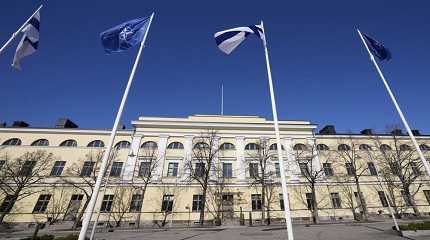
HELSINKI (AP) — Finland’s parliamentary website was paralyzed by a denial-of-service attack on Tuesday, just before the country made its historic entry into NATO, a move that more than doubles NATO’s border with Russia and has angered Russian President Vladimir Putin.
The attacks — in which participants flood targets with junk data — made the parliament’s site hard to use, with many pages not loading and some functions not available for a time.
A pro-Russian hacker group known as NoName057 (16) claimed responsibility, saying the attack was retaliation for Finland joining NATO. The hacker group, which has reportedly acted on Moscow’s orders, has taken part in a slew of cyberattacks on the U.S. and its allies in the past. The claim could not be immediately verified.
For the most part, Finns went about their business as usual on the bright cold day, belying the historic nature of Finland becoming the 31st member of NATO. Its membership was formalized with a series of steps in Brussels.
It’s a moment that most Finns had never previously wanted as they balanced friendly ties with both the West and Russia. But all that changed with Russia’s full-scale and brutal invasion of its neighbor Ukraine last year, creating a sudden and strong sense of insecurity that pushed the nation toward membership in the security alliance.
There were few outward signs of the geopolitical shift aside from the Finnish and NATO flags, both blue and white, fluttering against the backdrop of Helsinki’s deep blue sky.
The NATO flags were raised alongside the national flags in front of the Ministry of Foreign Affairs, a building that was originally built for the military of the Russian Empire in the 19th century. A regular flow of curious onlookers could be seen near the gates of the foreign ministry, trying to catch a glimpse of the flags.
Aki Luhtanen, a professor of psychiatric nursing who was among those stopping by the Foreign Ministry, said Russia’s war on Ukraine feels very close and NATO membership offers protection now and for the long term.
“I think we should be aware and afraid of Russia,” Luhtanen said. “And I think in the future (it) is very, very important to belong to NATO.”
It was on that same ministry building that Finnish authorities projected the colors of the Ukrainian flag after Russia’s invasion last year, in an early sign of strong support for Kyiv.
Newspapers, leaders and commentators alike agreed that Tuesday was a historic day for the nation of 5.5 million people that shares a a 1,340-kilometer (832-mile) border with Russia.
“Until now, we have defended our country alone,” Defense Minister Antti Kaikkonen told public broadcaster YLE on arrival in Brussels. “From now on, we can rely on getting outside help should things get tough. And of course, we are ready to help should someone be in trouble.”
Kaikkonen will join President Sauli Niinisto and Haavisto, the foreign minister, for the events in Brussels.
“This is historically very significant for Finland. Finland has never been militarily aligned before in its history,” said Juhana Aunesluoma, professor of political history at the University of Helsinki. “Of course, many things changed when Finland joined the European Union in 1995, but Finland remained militarily nonaligned.”
The ceremony in Brussels falls on NATO’s very own birthday, the 74th anniversary of the signing of its founding Washington Treaty on April 4, 1949. It also coincides with a meeting of the alliance’s foreign ministers.




